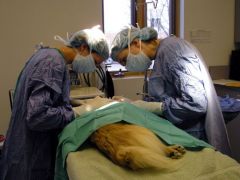
Congestive Heart Failure (CHF) is a clinical condition which is the final result of severe heart disease. It is usual that when a dog has heart failure, heart disease is also present in the body. However, it is true that in some cases, heart disease can be present, but never lead to congestive heart disease.
When high diastolic pressures in the heart build up into the veins and capillaries, then congestive heart failure can occur, which in turn causes a leakage of fluid out of those vessels.
Heart failure is the end result of many different cardiac and pericardial diseases. These include:
- Decreased myocardial contractibility. This is a weak heart muscle, which is commonly seen with dilated cardiomyopathy.
- Valvular regurgitation. This is a leak in one of the four heart valves, as seen with mitral and tricuspid regurgitation.
- Increased myocardial stiffness, which impairs the heart’s ability to fill with blood.
In the beginning, the signs of congestive heart failure can be quite mild and difficult to see. However the symptoms can become more severe in a short space of time. Some of the symptoms to look for are:
- Lack of energy – the dog becomes much less active and tires quickly during the later stages of congestive heart failure;
- Poor appetite;
- Weight loss;
- Heavy breathing – the dog can show signs of difficulty in breathing, panting and coughing whilst resting;
- Coughing;
- Swollen abdomen – the dogs’ stomach can enlarge as fluid accumulates in the liver and abdomen; and
- Change of mouth color – the color of the membranes of the mouth can be grayish rather than being a healthy pink color.
The first thing that is needs to be done though, is to manage the clinical signs of congestive heart failure by reducing the formation of edema and effusion and to increase the cardiac output, which is the delivery of blood to the tissues.
There are a wide variety of treatments available for Congestive Heart Failure, depending on the severity of the condition.
One of the most popular drugs used for this disease is Digitalis. This is a medication which belongs to a group called positive inotropic agents which help to increase the concentration of calcium in the heart muscle cells.
Diuretics are also another well known drug used for dogs with this condition. These drugs help to remove built up fluids that occur in the lungs and abdomen.
Monitor your dogs attitude and any changes in appearance when you spend time with your friend. It is essential to keep a diary of anything that varies from “the norm” so that you can show it to your vet. Check your dog on a daily basis for:
- breathing, see if it is heavy or labored;
- loss or reduction of appetite;
- restlessness;
- fainting; and
- profound lethargy.
However, it is important to remember, that canine congestive heart failure is a major disease and it is a necessity to have regular visits to your veterinarian to ensure that your dogs’ needs are being met.




